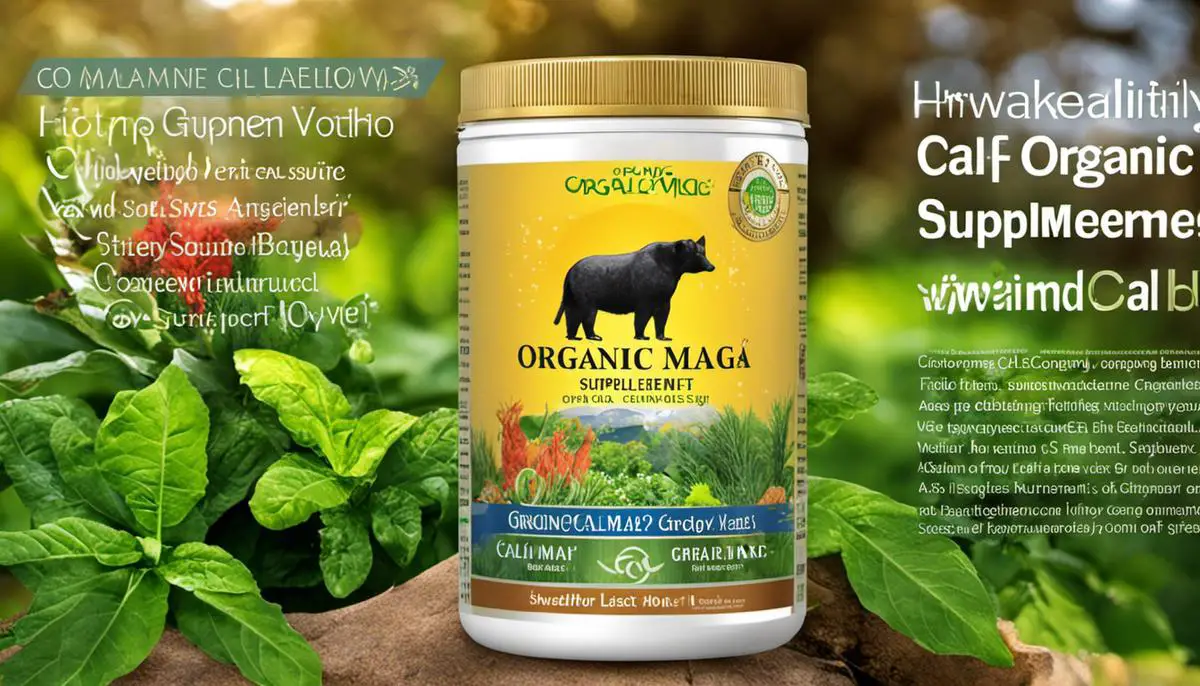Unraveling the Organic Nature of Cal Mag Supplements
In the ever-evolving world of nutritional supplements, one stands out due to its integral link to human health and wellness – Cal Mag. A compound blend of two vital minerals, Calcium and Magnesium, Cal Mag has been widely recognized for its role in promoting strong bones, heart health, and an array of body functions. In many cases, it’s supplemented with Vitamin D to aid absorption. As dietary supplementation becomes an increasingly common part of our modern lifestyles, many individuals are becoming more conscious and discerning about what they put into their bodies. As a part of this growing trend, a key question arises – is Cal Mag organic? The answer is not as simple as it may seem, and understanding it requires knowledge about the nature of Cal Mag supplements and the distinction between organic and non-organic products in the supplement market.
Understanding Cal Mag Supplements
Understanding Cal Mag Supplements
Cal Mag supplements are nutritional add-ons that supply essential minerals such as Calcium (Ca) and Magnesium (Mg) to the body. Some variations of these supplements also contain Vitamin D, which is integral in the absorption of Calcium. Both Calcium and Magnesium are crucial for many biological functions, including nerve function, muscle contraction, and maintaining strong bones and teeth.
Composition of Cal Mag Supplements
Cal Mag supplements typically contain a ratio of 2:1 of Calcium to Magnesium. This ratio is purported to the optimal balance for effective absorption and utilization in the body. The form of Calcium and Magnesium in these supplements can vary. Common forms include calcium carbonate, calcium citrate, magnesium citrate, and magnesium oxide.
Is Cal Mag Organic?
The term ‘organic’ in the context of dietary supplements is often related to the source from which the ingredients are derived. Many Cal Mag supplements are not labeled as organic because the minerals they contain are inorganic by nature. However, the terminology can also apply to how the minerals are processed or the additional ingredients that they may be bundled with. To qualify as an organic product, the supplement must not be genetically modified or treated with synthetic pesticides or fertilizers.
While the minerals themselves in Cal Mag supplements aren’t technically organic, some brands may use organically sourced additional ingredients. For instance, the Vitamin D in these supplements might come from organically reared sheep’s wool.
Choosing Organic Cal Mag Supplements
For those who prefer to consume organic products exclusively, there are options available where the additional ingredients are sourced organically. It’s important to pay attention to product labels. Look for supplements that are marked as ‘USDA Certified Organic’ or similar accreditation– this ensures that at least 95% of its ingredients meet the criteria set by the United States Department of Agriculture for organic products.
Considerations When Using Cal Mag Supplements
Like any dietary supplement, it’s important to consult a healthcare provider before incorporating Cal Mag supplements into your routine. This is particularly crucial if you take other medications or have medical conditions like kidney disease where excessive amounts of these minerals can be harmful.
As always, it’s best to first get your nutrients from a well-rounded diet. However, if you are deficient in either Calcium or Magnesium or have a specific health condition for which these supplements would be beneficial, Cal Mag could be a suitable addition to your health routine. Be sure to choose high-quality brands that follow good manufacturing practices and preferably have third-party testing to ensure purity and potency.
Conclusion: The Organic Factor in Cal Mag Supplements
While the primary minerals found in Cal Mag, such as calcium and magnesium, inherently can’t be classified as organic, it’s possible for the additional ingredients in these supplements to be sourced organically. It’s always a wise practice to check product labels meticulously and opt for supplements produced by reputable, top-tier brands.

Organic Vs. Non-Organic Supplements
Understanding the Difference Between Organic and Conventional Supplements
For initial clarity, it’s crucial to understand the distinction between organic and non-organic (or conventional) supplements. Organic supplements are typically derived from natural sources without the inclusion of synthetic or artificial elements. Conversely, conventional supplements may contain synthetic or other artificial substances in their composition.
Production of Organic Supplements
Organic supplements follow rigorous standards set out by several governing bodies. These include the National Organic Program (NOP) in the United States, European Union’s organic regulation, and many other international standards. For instance, in the United States, organic supplements must be manufactured without excluded methods, such as genetic engineering, ionizing radiation, or sewage sludge. They must also be produced using allowed substances as listed by the Organic Standards.
Cal Mag as an Organic Supplement
Cal Mag refers to a health supplement that combines Calcium and Magnesium, two essential nutrients for the body. Organic Cal Mag supplements are produced using natural sources of both these minerals, devoid of any artificial or synthetic ingredients. For example, calcium can be sourced from lithothamnion calcareum, a type of seaweed, and magnesium may be derived from genuine Zechstein magnesium chloride.
Impacts on Health and the Body
Organic supplements such as Cal Mag have several potential benefits for health and the body. Calcium and magnesium are crucial in maintaining bone health, muscle function, nerve communication, and a host of other vital processes. By using organic sources, the body’s ability to recognize and efficiently process these nutrients may improve.
Comparisons: Benefits and Drawbacks
The primary benefit of organic supplements, including Cal Mag, lies in their natural, non-synthetic origins. They are often held to rigorous production standards, reducing users’ exposure to potentially harmful chemicals or additives. They can sometimes offer higher bioavailability, meaning the body can more readily absorb and utilize their nutrients.
However, organic supplements come with potential drawbacks. They can be more expensive than their non-organic counterparts due to the cost of organic farming and certification. Moreover, there may be variations in nutrient content due to the natural sourcing method, which can affect nutrient consistency from batch to batch.
Understanding Organic Standards
When evaluating organic supplements, regulations can differ depending on the region and the standardizing organizations involved. However, key requirements usually include the use of 100% natural ingredients, adherence to organic processes, and an absence of synthetic substances or genetically modified organisms. Furthermore, non-toxic manufacturing methods, ethically sourced materials, and clear, transparent labeling are typically expected.
To verify a product’s organic status, look for certification badges on the packaging, such as the USDA Organic label. This ensures the product meets organic standards.

Is Cal Mag Organic?
What is Calcium Magnesium (Cal Mag)?
Calcium Magnesium, colloquially known as Cal Mag, is a widely used dietary supplement. It is frequently taken to support bone health, nerve and muscle function, while promoting overall body wellness. Cal Mag combines two vital minerals, calcium and magnesium, occasionally supplemented with Vitamin D for improved absorption by the body. These minerals are usually derived from a range of sources, where calcium might come from limestone, and magnesium from seawater.
Defining Organic Supplements
The term ‘organic’ in dietary supplements is a complex terminology in itself. The United States Department of Agriculture (USDA) and other international bodies have strict guidelines defining what constitutes an ‘organic’ product. For a supplement to be classified as organic, it must not include synthetic fillers, additives, genetically modified organisms (GMO), and must be sourced from organic farming practices devoid of pesticides, herbicides, or chemical fertilizers.
Is Cal Mag Production Organic?
Whether Cal Mag is organic or not depends heavily on its production process. Organic Cal Mag would imply that the calcium and magnesium sources, as well as any additional ingredients, are harvested organically without the use of chemicals, from nutrient-dense soil and/or uncontaminated seawater. In contrast, nonorganic Cal Mag could include minerals sourced from areas that underwent heavy chemical usage or contain other nonorganic additives.
Verifying Organic Status of Cal Mag
To ascertain the organic credentials of a Cal Mag supplement, check for certifications on the product label. In the U.S, look for the USDA Organic Seal, which assures that the product has been produced according to USDA’s stringent organic standards. Other international bodies also certify the ‘organic’ status of products, including the European Union (EU) Organic, Canada Organic, and Australia Certified Organic.
Importance of Purchasing Certified Organic Cal Mag
When supplementing your diet with Cal Mag, choosing a certified organic product is crucial. Organic Cal Mag supplements ensure you are getting the purest form of these vital minerals without unwanted synthetic substances. In addition, certified organic products support more sustainable farming practices that champion environmental health and sustainability compared to conventional farming methods.
Wrapping Up
Not all Cal Mag supplements are of an organic nature. Customer awareness regarding product labels and organic certification is crucial when deciding to purchase any supplement.

Benefits of Organic Cal Mag Supplements
Digging Deeper into Organic Cal Mag Supplements
Organic Cal Mag consists of a blend of three key components: calcium, magnesium, and often, vitamin D. These nutrients are specifically designed to promote bone wellness. When you select an organic variant, you’re ensuring that these vital elements are sourced from nature, primarily plants, rather than created synthetically. Organic supplements are devoid of artificial colors, flavors, sweeteners, or preservatives, providing you with a more wholesome and possibly beneficial option.
Health Benefits of Organic Cal Mag
Calcium and magnesium are essential minerals for the body. Calcium is key in supporting strong bones and teeth, while magnesium plays a role in hundreds of biochemical reactions in your body. It helps maintain nerve and muscle function, supports a healthy immune system, and plays a pivotal role in energy metabolism and protein synthesis.
Vitamin D is often included in Cal Mag supplements as it enhances calcium absorption in the body. In an organic supplement, it is likely derived from natural sources such as lichen or mushrooms.
Organic sources of these minerals can improve their absorption in the body. For instance, calcium derived from organic, plant-based sources, is often easier for the body to absorb and utilize compared with standard calcium carbonate or calcium citrate.
Organic Vs. Non-Organic
Organic supplements come from companies that meet the demanding standards of organic farming, which excludes the use of synthetic fertilizers, pesticides, and genetically modified organisms (GMOs). This adherence to natural farming practices not only potentially provides cleaner, healthier products but also aids in preserving the environment and promoting biodiversity.
Conversely, non-organic supplements may be derived from synthetic or semi-synthetic materials, utilizing chemical processes. They may also contain additives, artificial flavors or colors, or fillers.
Misconceptions about Organic Cal Mag Supplements
While organic Cal Mag supplements offer clear benefits, some misconceptions exist. One misconception is that organic supplements are automatically superior to non-organic ones. Although organic supplements are derived from natural sources, the body can still absorb and utilize non-organic minerals. Not all non-organic supplements are ‘unhealthy’, but they can be if they contain harmful additives or are derived from low-quality sources.
Another common misconception is that using organic Cal Mag supplements can entirely prevent or cure osteoporosis or other bone diseases. While these supplements support bone health and may reduce the risk of these conditions, they are not a definitive cure and should be part of a comprehensive approach to bone health, including a balanced diet and regular exercise.
The efficacy of organic supplements, just like non-organic ones, can vary between individuals. Some people may notice significant benefits while others may not, due to factors such as individual absorption rates, diet, lifestyle, and overall health. Hence, it’s always advisable to consult a healthcare provider before starting any supplement regimen.

Organic Cal Mag supplements present a powerful proposition with potentially far-reaching benefits for both individual health and environmental sustainability. While they may be costlier, their free-from-synthetic-ingredients appeal is compelling to a growing number of health-conscious consumers. Navigating the Cal Mag landscape isn’t easy as it necessitates vigilance and understanding of the “organic” label, supplement production processes, and individual health needs. However, the effort put into understanding this better can pay dividends in the form of improved overall health, reduced environmental impact, and informed health choices. As always, it’s crucial to consult a healthcare provider prior to introducing any new supplements to your regimen.
